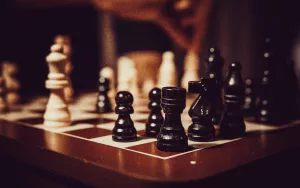Why Are Chess Players Always Late? Punctuality in the Chess World

Chess players are often known for their habit of being late to tournaments and matches. This phenomenon is not limited to a particular player or region but is a common occurrence in the chess world. The reasons behind this behavior are multifaceted and can be attributed to various factors.
Understanding chess culture is essential to comprehend the reasons behind the lateness of chess players. Chess is a game that requires intense concentration and critical thinking, which can be mentally exhausting. Players often spend hours analyzing the game and developing new strategies, leading to a lack of awareness of their surroundings. Additionally, the chess community is known for its introverted nature, and players may struggle with time management due to their solitary personalities.
Key Takeaways
- Chess culture and the nature of the game may contribute to players’ lateness.
- The role of strategy and time in chess can lead to players losing track of time.
- Factors such as psychological elements and lack of awareness may also contribute to players’ lateness.
Understanding Chess Culture
Chess culture is a unique phenomenon that has developed over centuries. It encompasses all aspects of the game, from the way players behave to the strategies they employ. Understanding chess culture is essential for anyone who wants to become a part of the chess community.
One of the most noticeable aspects of chess culture is the emphasis on punctuality. Chess players are notorious for being late, which can be frustrating for their opponents. However, this is not because they are disrespectful or careless. Rather, it is because they want to be fully prepared for the game.
Chess players often spend hours studying their opponent’s previous games and analyzing their own strategies. They want to be sure that they are fully prepared for the game and have a plan in place. This can lead to delays, as they may need more time to finish their preparations.
Another aspect of chess culture is the importance of tradition. Chess has a rich history, and players often look to the past for inspiration. They may study the games of famous players like Bobby Fischer or Garry Kasparov, looking for strategies that they can incorporate into their own play.
Chess culture also places a high value on sportsmanship and fair play. Players are expected to follow the rules and show respect for their opponents. Cheating is not tolerated, and players who are caught breaking the rules may face serious consequences.
In conclusion, understanding chess culture is essential for anyone who wants to become a part of the chess community. It encompasses punctuality, tradition, and sportsmanship, among other things. By embracing these values, players can become better chess players and contribute to the growth of the game.
The Role of Strategy and Time in Chess
Chess is a game of strategy that requires players to think ahead and make calculated moves. Time is also a crucial element in chess as each player has a limited amount of time to make their moves. In competitive chess, players are required to keep track of their time using a chess clock.
The strategy in chess involves long-term goals, usually related to king safety, pawn structure, space, piece activity, and more. A player’s strategy can change throughout the game as they adapt to their opponent’s moves. A good chess player must be able to think ahead and anticipate their opponent’s moves to create a winning strategy.
Time management is also an important aspect of chess strategy. Each player has a limited amount of time to make their moves, and if they exceed that time limit, they may lose the game. Players must balance their time between thinking through their moves and making them quickly enough to stay within the time limit.
In competitive chess, players use a chess clock to keep track of their time. The clock has two timers, one for each player, and the players take turns pressing the button to start their timer and stop their opponent’s timer. The clock adds an element of pressure to the game, as players must make their moves quickly enough to stay within the time limit.
In summary, strategy and time management are both crucial elements in chess. A good chess player must be able to think ahead and create a winning strategy, while also managing their time effectively to stay within the time limit. The use of a chess clock adds an extra layer of pressure to the game, making it even more challenging and exciting for players and spectators alike.
Psychological Elements
Psychological factors play an important role in the behavior of chess players, including their tendency to be late. Here are some of the psychological elements that can contribute to this behavior:
Stress and Anxiety
Chess is a game that requires intense concentration and focus. Players often experience stress and anxiety during tournaments, which can cause them to lose track of time and be late for games. Additionally, the pressure to perform well and the fear of failure can lead to procrastination and avoidance behaviors, making it difficult for players to arrive on time.
Perfectionism
Many chess players are perfectionists, striving for excellence in their game. This can lead to an obsessive focus on preparation and analysis, causing them to lose track of time and be late for games. Additionally, perfectionists may have difficulty delegating tasks or trusting others to help them, which can lead to delays and missed deadlines.
Time Management
Effective time management is crucial for success in chess. However, some players struggle with this skill, leading to chronic lateness. Poor time management can be caused by a variety of factors, including procrastination, poor organizational skills, and a lack of awareness of the passage of time.
Personality Traits
Certain personality traits may also contribute to chronic lateness among chess players. For example, individuals who are highly creative or spontaneous may struggle with the structure and routine required for effective time management. Similarly, individuals who are easily distracted or have difficulty focusing may struggle to stay on schedule.
Overall, the psychological elements that contribute to chronic lateness among chess players are complex and multifaceted. By understanding these factors, players can take steps to improve their time management skills and arrive on time for games.
Factors Influencing Lateness
There are a number of factors that can contribute to chess players being consistently late for games and tournaments. Some of these factors include:
- Time Perception: Chess players often have a highly developed sense of time, which can lead them to underestimate how long it will take to get to a game or tournament. They may also become so engrossed in their preparation that they lose track of time and end up running late.
- Time Management: Effective time management is crucial for chess players, both on and off the board. However, some players may struggle with managing their time effectively, which can lead to lateness. This can be due to a lack of organizational skills or a tendency to procrastinate.
- Personality: Certain personality traits may make it more difficult for chess players to arrive on time. For example, individuals who are highly disorganized or who struggle with attention to detail may find it challenging to arrive on time. Similarly, individuals who are easily distracted or have a tendency to get lost in their own thoughts may struggle to stay focused on getting to their destination on time.
- Preparation: Chess players often spend a significant amount of time preparing for games and tournaments. This can include studying openings, analyzing previous games, and practicing tactics. However, this preparation can sometimes come at the expense of other tasks, such as packing and planning travel arrangements. As a result, players may find themselves rushing to get everything done and end up being late.
Overall, there are many factors that can contribute to chess players being consistently late for games and tournaments. By recognizing these factors and taking steps to address them, players can improve their time management skills and arrive on time more consistently.
Chess Etiquettes and Rules
Chess is a game that requires not only mental sharpness but also proper etiquette and sportsmanship. Here are some basic rules and guidelines to follow when playing chess:
- Arrive on time: Being punctual is essential in chess, as it shows respect for your opponent’s time and the game itself. Arriving late can disrupt the game and cause unnecessary stress for both players.
- Shake hands: Before and after the game, it is customary to shake hands with your opponent as a sign of good sportsmanship.
- Silence and focus: Chess requires concentration, so it’s important to maintain silence and avoid any distractions during the game. Talking or using hand gestures during the game is not allowed.
- Touch-move rule: Once a player touches a piece, they must move it unless it is an illegal move. This rule ensures fair play and prevents players from changing their minds after making a move.
- Pressing the clock: After making a move, a player must press the clock to start their opponent’s time. Failure to do so can result in a penalty.
- Announcing check and checkmate: When a player puts their opponent’s king in check, they must say “check.” If they put their opponent’s king in a position where it cannot escape capture, they must say “checkmate” to end the game.
- Offering and accepting a draw: If a player believes the game is a draw, they may offer a draw to their opponent. If the opponent accepts, the game ends in a draw.
- Resignation: If a player believes they cannot win the game, they may resign to concede the game to their opponent.
- Recording moves: In official tournaments, players must record their moves on a scoresheet to keep track of the game’s progress.
- Respecting the playing environment: Players must respect the playing environment, which includes not disturbing other games, not using electronic devices, and keeping the area clean and tidy.
By following these rules and guidelines, chess players can ensure fair play, good sportsmanship, and an enjoyable game for all.
Impact of Lateness on the Game
Lateness in chess can have a significant impact on the game, both for the late player and their opponent. Here are a few key ways that lateness can affect a chess game:
Time Management
One of the most obvious impacts of lateness is on time management. In timed games, players are given a set amount of time to make their moves, and if a player is late, they lose valuable time that they could have used to think about their strategy. This can put the late player at a disadvantage, especially if they are already prone to taking longer to make their moves.
Psychological Factors
Lateness can also have psychological effects on both players. The player who is on time may become annoyed or frustrated at having to wait, which can affect their focus and concentration during the game. Meanwhile, the late player may feel rushed or flustered, which can affect their decision-making and cause them to make mistakes.
Disruption of Routines
Finally, lateness can disrupt the routines that players have established for themselves. For example, a player who always arrives early to set up their pieces and review their strategy may feel thrown off if they are suddenly rushing to set up at the last minute. This can affect their mental preparation for the game and potentially impact their performance.
Overall, lateness can have a range of impacts on a chess game, from time management to psychological factors to disruption of routines. It is important for players to arrive on time and be respectful of their opponents’ time and preparation.
Addressing the Issue of Lateness
Chess players are notorious for being late to their games, causing frustration for their opponents and organizers alike. While there are various reasons why a player may be late, it is important to address this issue to ensure that the game starts promptly and runs smoothly.
One way to address lateness is to set clear expectations and consequences for tardiness. Tournament organizers can communicate the start time of each round and emphasize the importance of being on time. They can also establish penalties for players who arrive late, such as forfeiting their first few moves or losing time on the clock.
Another approach is to identify and address the root causes of lateness. For example, some players may struggle with time management or organization. Providing resources, such as time management tools or coaching, can help these players improve their skills and arrive on time.
In addition, it may be helpful to create a culture of punctuality within the chess community. This can be achieved by modeling punctuality at all levels, from tournament organizers to top players. Encouraging players to arrive early and socialize before the game can also help create a positive atmosphere and reduce the stress associated with being late.
Ultimately, addressing the issue of lateness requires a combination of clear expectations, support for players, and a culture that values punctuality. By taking these steps, organizers and players can work together to ensure that games start on time and run smoothly, enhancing the overall experience for everyone involved.
Conclusion
In conclusion, the reasons why chess players are always late can vary from person to person and situation to situation. Some players may have a tendency to procrastinate, while others may struggle with time management or simply underestimate the amount of time needed to prepare for a game. Additionally, external factors such as traffic, weather, and other unforeseen circumstances can also contribute to a player’s tardiness.
Despite the prevalence of this issue, there are steps that players can take to avoid being late to games. These include setting realistic goals for preparation time, creating a schedule or checklist to stay organized, and leaving extra time for unexpected delays. It is also important for players to communicate with their opponents and tournament organizers if they anticipate being late, in order to avoid causing unnecessary stress or inconvenience.
Overall, while being late may not seem like a major issue, it can have significant consequences for both the player and their opponent. By taking steps to improve their time management skills and communicate effectively, chess players can ensure that they arrive on time and ready to play, improving their chances of success both on and off the board.








